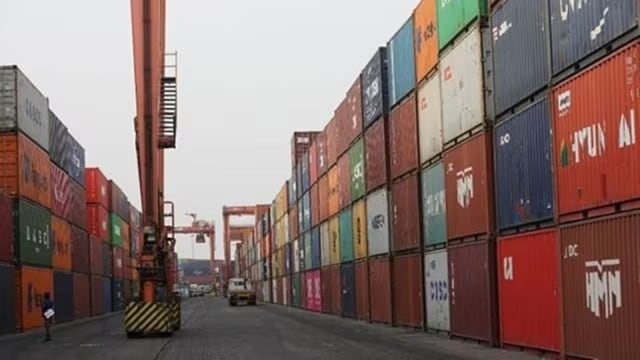- India
- International
Govt clamps down on dumping from China: Over 1/3rd anti-dumping duties levied in cases with sole or two producers since FY22
In FY23, the number of cases concluded dropped by half to 25 out of which 24 ended with an ADD recommendation and CBIC accepted only 10, 3 of which covered goods only from China and 4 from at least one other country.
 According to a GTRI report, between FY19 and FY24, India’s imports from China surged from $70 billion to $101 billion while exports to China remained stagnant at around $16 billion annually. (Representational Image)
According to a GTRI report, between FY19 and FY24, India’s imports from China surged from $70 billion to $101 billion while exports to China remained stagnant at around $16 billion annually. (Representational Image)Over one-third of anti-dumping duties imposed by the Finance Ministry in the last three financial years covered goods manufactured by either a sole domestic producer or just two producers, mostly from the chemical industry. Of the 46 anti-dumping duties levied in the latest three fiscals, 60 per cent targeted goods originating only in China and 26 per cent targeted goods originating in China and at least one other country. Moreover, the Finance Ministry levied an anti-dumping duty in 86 per cent of the cases recommended by the Ministry of Commerce and Industry in FY24, a sharp rise from 42 per cent in the previous two fiscals.
The Directorate General of Trade Remedies (DGTR), India’s trade watchdog under the Commerce Ministry, recommended an anti-dumping duty (ADD) in the final findings of 92 anti-dumping investigations in the last three financial years. Roughly 33 per cent of these investigations covered goods manufactured by a sole domestic producer or at most two producers, as noted by DGTR itself in case proceedings. The Central Board of Indirect Taxes and Customs (CBIC) under the Finance Ministry levied an ADD on the import of goods covered by 46 of these cases, exactly 50 per cent of the recommendations received from DGTR.
Of all ADD recommendations accepted by CBIC, 37 per cent covered goods manufactured by either a sole domestic producer or just two producers. Most of these targeted chemical goods and were initiated by companies including Laxmi Organics Industries Ltd, Sudarshan Chemical Industries Ltd, Cabot Sanmar Ltd, Gujarat Fluorochemicals Ltd, Arch Pharmalabs Ltd, Gujarat Narmada Valley Fertilisers & Chemicals Ltd, Vinati Organics Ltd, and Welspun India Ltd.
In 11 instances over the last three financial years, CBIC did not accept DGTR’s recommendation in anti-dumping cases initiated by sole producers, including Reliance Industries Ltd, Borosil Renewables Ltd, SRF Ltd, and Gujarat State Fertilisers and Chemicals Ltd.
The impact of anti-dumping duties on downstream users, who benefit from cheap imports of raw materials, is a major consideration in the Finance Ministry’s decision to accept or reject an ADD recommendation by DGTR, sources said. The Finance Ministry also looks at how compelling the evidence presented in a DGTR investigation is before making a decision, they added. For example, CBIC did not accept a recommendation to continue with an ADD on the import of viscose staple fibre (VSF) in 2023, after user industry representations were made to the Finance Minister. Aditya Birla Group-owned Grasim Industries Ltd is the sole producer of VSF in India and was found to be abusing its dominant position in the VSF market by the Competition Commission of India (CCI) in 2021. Both the Commerce Ministry and the Finance Ministry did not respond when sought for comments.

“There are strong arguments on both sides. The sole producer argues if they should shut shop? And then a strong argument is that do you prefer a domestic monopoly over a Chinese monopoly? It is a rather tough call,” a senior government official said.
“The domestic industry argues against removal of the duty [in sunset reviews] saying that China has not become a market economy in the last ten years. And so long as China is dumping or continues to be a non-market economy, the domestic industry says that it is entitled to a level playing field. The other side argues that if 10 years were not enough [to develop competitiveness], what is?,” the official added.
According to Ajay Srivastava, founder of economic think tank Global Trade Research Initiative (GTRI), there is no justification for sole producers asking for ADDs “unless the product is of high strategic importance”. “Few big corporations get their way, but this only inflates their profits, with no gain to downstream industries,” he said. Goods targeted by ADDs levied in the last three financial years to protect sole or two producers from dumping include ursodeoxycholic acid, sodium aluminosilicate, toluene diisocyanate, methyl acetoacetate, untreated fumed silica, electro-galvanised steel, and self-adhesive vinyl.
Dumping is an unfair trade practice that occurs when goods are exported from one country to another at a price lower than their normal value. DGTR investigates cases of anti-dumping brought forward by industry players and recommends an ADD and the margin of duty in case of a consequential serious injury to domestic industry. CBIC has to accept or refuse DGTR’s ADD recommendation within three months from the date of the final hearing. The imposition of anti-dumping duties is a legitimate trade remedial measure under the World Trade Organization (WTO) rules.
DGTR recommended an anti-dumping duty (ADD) in the final findings of 21 of the 23 cases concluded in FY24, including both original investigations and sunset reviews. Following DGTR’s recommendation, CBIC imposed an ADD on the import of goods covered by 16 of these cases. Of the remaining 5 recommendations, CBIC did not accept 3 and is yet to decide on 2. The 86 per cent acceptance rate in FY24 is more than double of 42 per cent in both FY23 and FY22. “Since December, all anti-dumping duty recommendations sent by the Commerce Ministry have been accepted by the Finance Ministry,” the official said. DGTR recommended an ADD in 7 cases concluded between December and March, and CBIC accepted 5 recommendations and remains undecided on 2.
“Reliance on inexpensive capital goods from specific foreign countries, like China, exposes economies to heightened geopolitical risks, trade disputes, and supply chain vulnerabilities. Initially beneficial, the dependency on lower-cost goods can suppress investment in higher-quality or innovative products. This may place domestic producers at a competitive disadvantage against international rivals who prioritise more advanced — and often more costly — technologies,” said Srivastava.
“India needs to focus on developing its capital goods sector. Except for very high end products, technology is freely available and Indian engineers can reverse engineer most capital goods. High demand will justify investment in scale products,” he added.
In FY22, DGTR concluded 50 cases out of which it recommended an ADD in 47 cases and CBIC accepted 20, 14 of which exclusively targeted goods from China and 5 from at least one more country. There was a flurry of anti-dumping cases in FY22 because of the pandemic-induced recessionary market and better awareness among domestic producers to use this course of action, sources said.
In FY23, the number of cases concluded dropped by half to 25 out of which 24 ended with an ADD recommendation and CBIC accepted only 10, 3 of which covered goods only from China and 4 from at least one other country.
According to sources, CBIC accepted around 95 per cent of all ADD recommendations made by DGTR in the years prior to the coronavirus pandemic. The acceptance rate went down in the years following the pandemic due to supply chain disruptions, pressure from supply chain partners, and a perception of “protectionism”, they said. The recent surge in the acceptance rate indicates the government’s growing comfort with the tariff route to tackle dumping.
Currently, there are 7 ongoing cases that cover goods manufactured by sole producers. These include — aluminium frame for solar panels/modules produced by Adani Group-owned Vishakha Metals Pvt Ltd, two variants of synthetic rubber made by a Reliance Industries Ltd-owned company, and a vitamin A supplement made by Piramal Pharma Ltd. While 6 of these investigations target goods from China, 3 also target goods from the USA and 2 target goods from Russia.
According to a GTRI report, between FY19 and FY24, India’s imports from China surged from $70 billion to $101 billion while exports to China remained stagnant at around $16 billion annually.
May 19: Latest News
- 01
- 02
- 03
- 04
- 05





























